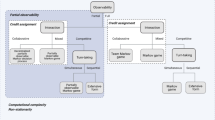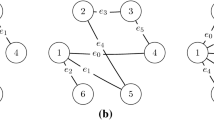Abstract
We compare the performance of two connectionist models developed to account for some specific aspects of the decision making process in the Iterated Prisoner’s Dilemma Game. Both models are based on common recurrent network architecture. The first of them uses a backward-oriented reinforcement learning algorithm for learning to play the game while the second one makes its move decisions based on generated predictions about future games, moves and payoffs. Both models involve prediction of the opponent move and of the expected payoff and have an in-built autoassociator in their architecture aimed at more efficient payoff matrix representation. The results of the simulations show that the model with explicit anticipation about game outcomes could reproduce the experimentally observed dependency of the cooperation rate on the so-called cooperation index thus showing the importance of anticipation in modeling the actual decision making process in human participants. The role of the models’ building blocks and mechanisms is investigated and discussed. Comparisons with experiments with human participants are presented.
Access this chapter
Tax calculation will be finalised at checkout
Purchases are for personal use only
Preview
Unable to display preview. Download preview PDF.
Similar content being viewed by others
References
Colman, A.: Cooperation, Psychological Game Theory, and Limitations of Rationality in Social Interaction. Behav. Brain Sci. 26, 139–153 (2003)
Hristova, E., Grinberg, M.: Context Effects On Judgment Scales in the Prisoner’s Dilemma Game. In: Proceedings of the 1st European Conference on Cognitive Economics. ECCE1, Gif-sur-Yvette, France (2004)
Hristova, E., Grinberg, M.: Investigation of Context Effects in Iterated Prisoner’s Dilemma Game. In: Dey, A.K., Kokinov, B., Leake, D., Turner, R. (eds.) CONTEXT 2005. LNCS (LNAI), vol. 3554, pp. 183–196. Springer, Heidelberg (2005)
Hristova, E., Grinberg, M.: Information Acquisition in the Iterated Prisoner’s Dilemma Game: An Eye-tracking Study. In: Proceedings of the 27th Annual Conference of the Cognitive Science Society, Erlbaum, Hillsdale (2005)
Grinberg, M., Hristova, E., Popova, M.: Applicability of Eye-Tracking Information Acquisition Methods for Studying the Strategy Dynamics in the Iterated Prisoner’s Dilemma Game. Position paper in the workshop: What have eye movements told us so far, and what is next. In: CogSci 2006, The 28th Annual Conference of the Cognitive Science Society, Vancouver (July 26-29, 2006)
Rapoport, A., Chammah, A.: Prisoner’s Dilemma: A Study in Conflict and Cooperation. University of Michigan Press, Ann Arbor (1965)
Erev, I., Roth, A.: Simple reinforcement learning models and reciprocation in the prisoner’s dilemma game. In: Gigerenzer, G., Selten, R. (eds.) Bounded rationality: the adaptive toolbox, MIT Press, Cambridge, Mass (2001)
Camerer, C., Ho, T.-H., Chong, J.: Sophisticated EWA Learning and Strategic Teaching in Repeated Games. J. Econ. Theory 104, 137–188 (2002)
Macy, M.W., Flache, A.: Learning Dynamics in Social Dilemmas. PNAS 99(suppl. 3), 7229–7236 (2002)
Taiji, M., Ikegami, T.: Dynamics of Internal Models in Game Players. Physica D 134, 253–266 (1999)
Elman, J.L.: Finding structure in time. Cognitive Science 14, 179–211 (1990)
Leydesdorff, L.L., Dubois, D.: Anticipation in Social Systems. International Journal of Computing Anticipatory Systems 15, 203–216 (2004)
Author information
Authors and Affiliations
Editor information
Rights and permissions
Copyright information
© 2007 Springer-Verlag Berlin Heidelberg
About this paper
Cite this paper
Lalev, E., Grinberg, M. (2007). Backward vs. Forward-Oriented Decision Making in the Iterated Prisoner’s Dilemma: A Comparison Between Two Connectionist Models. In: Butz, M.V., Sigaud, O., Pezzulo, G., Baldassarre, G. (eds) Anticipatory Behavior in Adaptive Learning Systems. ABiALS 2006. Lecture Notes in Computer Science(), vol 4520. Springer, Berlin, Heidelberg. https://doi.org/10.1007/978-3-540-74262-3_19
Download citation
DOI: https://doi.org/10.1007/978-3-540-74262-3_19
Publisher Name: Springer, Berlin, Heidelberg
Print ISBN: 978-3-540-74261-6
Online ISBN: 978-3-540-74262-3
eBook Packages: Computer ScienceComputer Science (R0)




